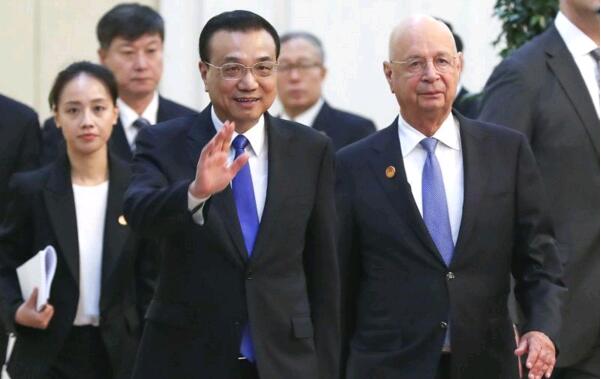 Chinese Premier Li Keqiang (left) held a dialogue meeting with representatives from business, finance, think tanks and media circles attending the 2018 Summer Davos Forum at Tianjin Meijiang Convention and Exhibition Center.(Xinhua News Agency)
Chinese Premier Li Keqiang (left) held a dialogue meeting with representatives from business, finance, think tanks and media circles attending the 2018 Summer Davos Forum at Tianjin Meijiang Convention and Exhibition Center.(Xinhua News Agency)
Li Keqiang said that China has benefited from opening up and will continue to expand opening up.Existing multilateral trade rules can be discussed and improved through talks.
(Bloomberg, BEIJING) -- Chinese Premier Li Keqiang said yesterday that China will unswervingly open up its service sector, even if the service trade deficit will continue to widen as a result.He also said that China does not pursue a trade surplus in goods, but wants a trade balance.
Li Keqiang met with senior executives of foreign companies during the Summer Davos Forum held in Tianjin yesterday and said: China does not pursue a trade surplus in goods, but hopes for a trade balance.
He said that China has benefited from opening up and will continue to expand opening up.Existing multilateral trade rules can be discussed and improved through talks.The day before, Li Keqiang mentioned in his speech at the forum that the overall level of China's tariffs will continue to be reduced, but he did not provide details.
Trade in goods and services is the main component of the current account of the balance of payments. In recent years, the deficit in trade in services has gradually expanded, while the surplus in trade in goods has fluctuated and declined. The current account balance tends to be balanced as a whole.Account deficit.If, as Li Keqiang said, the service trade deficit continues to expand, and the goods trade further tends to balance, the current account deficit will inevitably become more common.
For most of the past 20 years, the trade surplus has been one of the main driving forces for the appreciation of the renminbi. If the trade balance turns into a balance or even a deficit, the support of the renminbi will also weaken.Yi Gang, Governor of the People's Bank of China, also emphasized this structural change in China's foreign trade in an exclusive interview with Caixin, pointing out that the observation of bilateral trade should not only focus on trade in goods, but also trade in services.
Informed sources: China intends to cut the most-favored-nation tax rate
The Sino-US trade war continues to escalate, and China has not given up its efforts to promote trade balance.People familiar with the matter said that China plans to lower the most-favored-nation tax rate and reduce the overall level of China's import tariffs. The new most-favored-nation tax rate will take effect as soon as next month.
As a member of the World Trade Organization (WTO), China is obliged to grant most-favored-nation treatment to other WTO members, except for special exceptions.According to the WTO website, the current average most-favored-nation tax rate in China is 9.8%.
Bloomberg asked China's Ministry of Finance to comment on the matter via fax, but has yet to receive a reply.
As a member of the WTO, the United States will also benefit from the reduction of the most-favored-nation tax rate.However, in the context of the trade war, China will impose more tariffs on the United States alone, and the overall tax rate on goods imported from the United States will still increase significantly.The United States announced that next Monday (September 24) it will impose tariffs on US$200 billion (approximately S$274 billion) of Chinese products.China’s State Council issued an announcement the day before yesterday, imposing additional tariffs of 10% or 5% on imported goods originating in the United States at approximately US$60 billion (S$82.2 billion) at 12:01 on the same day.In addition, China also announced that it would file an additional complaint with the WTO regarding the US Section 301 investigation and proposed measures to impose tariffs on China's US$200 billion worth of products exported to the US. The Ministry of Commerce of China said that the U.S. insisted on raising tariffs, which brought uncertainty to the negotiations between the two sides and hoped to correct it in time
Chinese Ministry of Commerce spokesman Gao Feng said today that he is assessing the impact of US$200 billion (approximately SGD 273.7 billion) of tariffs imposed by the US on companies, and studying targeted measures to help companies cope with challenges; the US insists on raising tariffs for China-US negotiationsIt brings uncertain effects, and we hope that the U.S. will correct it in time and properly resolve it.
According to Reuters reports, Gao Feng said at a press conference held by the Ministry of Commerce that China has a huge domestic market, and some foreign-funded foreign trade companies are indeed exploring the domestic market., to create a fair environment where domestic and foreign-funded enterprises are treated equally, and will provide better services for foreign companies.
China's countermeasures are all coerced, and are to safeguard its own rights and interests and the international trade order, and have nothing to do with US domestic politics.Gao Feng also reiterated that China will not use the RMB exchange rate as a tool, and will never take the path of devaluing the RMB to stimulate exports.
Regarding China's domestic consumer market, Gao Feng pointed out that as the national economy continues to maintain an overall stable and stable development trend, and a series of policies and measures to promote sales are accelerated, it is expected that the steady development of the consumer market will remain.
He said that the auto market will continue to grow steadily in the second half of the year, due to the low stock ownership and growth potential, new energy vehicle policies will help related consumption, and auto exports are on the rise.



